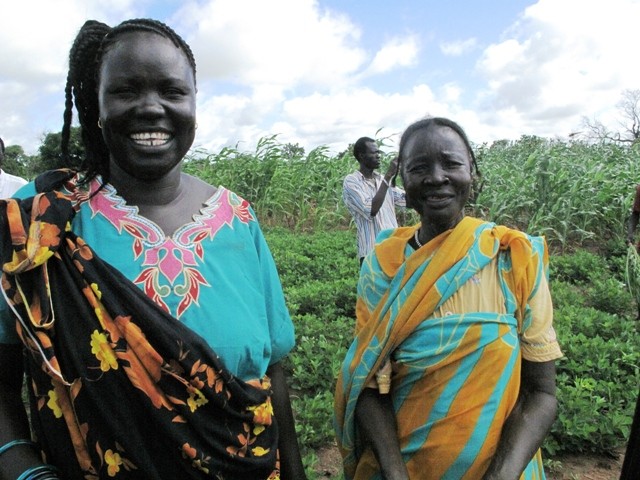
Elizabeth Abuk, a married mother of four, recently rallied 500 farmers in South Sudan to form a cooperative that has improved the standard of living of the entire group and their families, some 3,500 people. By joining forces and establishing the Aweil Charity Community for Development, this group of impoverished farmers obtained seeds, material to build a storeroom for their harvest, and advice from state Ministry of Agriculture extension workers.
USAID is seeking creative ways to boost food security in South Sudan, which includes supporting the World Food Program (WFP) Food for Assets initiative. Through Food for Assets, subsistence farmers work on projects to benefit their community in exchange for food—freeing them from the daily worry of where the next meal will come from while making the entire community more food secure. Projects might include building a dike to prevent seasonal flooding of their crops, a feeder road to help them bring their crops to market, or a storage facility like the community in Aweil Centre County built.
“When people are caught in the poverty trap, they are often risk averse. WFP Food for Assets projects allow these people to dare to do things for the longer term benefit of their communities,” said WFP South Sudan Country Director Chris Nikoi.
Abuk started the community group in the village of War Adhot in Northern Bahr al Ghazal state with 30 members in 2010. Today, its 500 members encourage each other to create food security and end years of chronic hunger. WFP donated 243 metric tons of food to the community, which included sorghum, oil, pulses and salt, for a period of six months. WFP also trained farmers to help improve crop yields.
The community plants staple crops such as sorghum, maize and groundnuts. The farmers harvested 950 bags of groundnuts, 10 bags of sesame, and 100 bags of sorghum during the cropping and harvesting period between April and September 2012.
”This group produced even more food than they need, they have seeds for the next season, and then we don’t have to come back to that community next year,” explained USAID Food for Peace officer Bill Hagelman. “Food for Assets is critical in helping to decrease the need of emergency feeding programs,” he added.
Through its Food for Assets project, which started in April 2012, WFP assisted 445,000 residents in South Sudan between April and December 2012. WFP plans to reach about 1 million people in South Sudan through Food for Assets activities in 2013.
USAID is the largest provider of food assistance to South Sudan, contributing 41 percent of WFP’s funding.







Comment
Make a general inquiry or suggest an improvement.